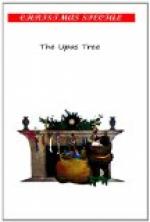“What a rum fellow you must be, West, to pay a hundred and fifty pounds for an instrument you have no notion of playing. Is it destined to be kept under lock and key in a glass case?”
“Certainly not,” said Ronald West. “I shall be able to play it when I try; and I shall try as soon as I get home.”
“Give us a sample here.”
“No, not here. I particularly wish to play it first with Helen, in the room where I told her a ’cello was the instrument I had always wanted. Oh, I say, isn’t it a beauty! Look at those curves, and that wonderful polish, like the richest brown of the very darkest horse-chestnut you ever saw in a bursting bur! See how the silver strings shine in the firelight, against the black ebony of the finger-board! It was made at Prague, and it is a hundred and fifty years old. I call it the Infant of Prague.”
“Why the ’Infant’?”
“Because you have to be so careful not to bump its head as you carry it about. Also, isn’t there a verse somewhere, about an Infant of Days who was a hundred years old, and young at that? Helen will love the Infant. She will polish it with a silk handkerchief, and make a bed for it on the sofa! I shan’t write to her about it. I shall bring it home as a surprise.”
He took his eyes from the ’cello and looked across at Helen’s cousin; but Aubrey Treherne instantly shifted his gaze to the unconscious Infant.
“Tell me how you came across it. There is no doubt you have been fortunate enough to pick up an instrument of extraordinary value and beauty.”
“Ah, you realise that?” cried Ronald. “Good! Well, you shall hear exactly what happened. I arrived here early this morning, put up at a hotel, and sallied out to interview the publishers. I had a mass of ‘copy’ to show them, because I have been writing incessantly the whole way home. Curiously enough, since I left Africa, I have scarcely needed any sleep. Snatches of half an hour seem all I require. It is convenient when one has a vast amount of work to get through in a short space of time.”
“Very convenient. Just the reverse of the sleeping sickness.”
“Rather! I was never fitter in my life—as I told Dick Cameron.”
Aubrey Treherne glanced at the bright burning eyes and flushed face—the feverish blood showing, even through the tan of Africa.
“Yes, you look jolly fit,” he said. “Who is Dick Cameron?”
“A great chum of mine. We met, as boys in Edinburgh, and were at school together. He is the son of Colonel Cameron of Transvaal fame, killed while leading a charge. Dick has done awfully well in the medical, passed all necessary exams, and taken every possible degree. He is now looking out for a practice, and meanwhile a big man in London has sent him out to investigate one of these queer water friction cures—professes to cure cataract and cancer and every known disease, by simply sitting you in a tub, and rubbing you down with a dish-cloth. Dick Cameron says—Hullo! Why are we talking of Dick Cameron? I thought I was telling you about the ’cello.”




